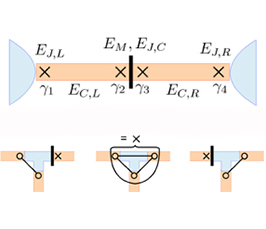Making Majoranas talk to charge
CFEL Theory Seminar
- Datum: 29.06.2016
- Uhrzeit: 14:00 - 15:00
- Vortragende(r): Martin Leijnse
- Lund University (Sweden) and Center for Quantum Devices (Denmark)
- Ort: CFEL (Bldg. 99)
- Raum: Seminar Room IV, O1.111
- Gastgeber: Angel Rubio

In this talk, I will first give an introduction to Majorana bound states (MBS), zero-energy modes predicted to appear in exotic spin-polarized p-wave superconductors. MBS satisfy non-Abelian statistics and, in addition, encode quantum information in a topologically protected manner, which makes them highly interesting for quantum computation applications. The required p-wave superconductivity seems to be hard to find in nature, but recent theoretical works have shown that it can instead be artificially engineered, for example in a semiconductor nanowire with strong spin-orbit coupling which is covered by a superconductor and exposed to a magnetic field. I will also discuss the recent experimental progress towards creating and detecting MBS.
I will then focus on the next generation of MBS experiments, which must go beyond merely detecting the existence of MBS, and instead probe their exotic properties, such as the (hopefully) exceptionally long coherence times and non-Abelian statistics. To accomplish this, one must find controllable ways to initialize, manipulate, and read out the quantum information encoded in MBS. I will discuss one possible platform for this next generation of MBS experiments, which is based on coupling the quantum information encoded in MBS to charge degrees of freedom, which provides convenient ways both of coupling different MBS qubits to each other (for manipulation), and of coupling to the outside world (for initialization and readout). I will explain how MBS-charge couplings can be controllably switched on and off in a setup where small superconducting islands are coupled to each other and to a macrosopic superconductor through gate-controlled Josephson junctions. Based on this control, we will see how the most important milestones on the way to topological quantum information processing can be achieved, and what the associated experimental requirements are.